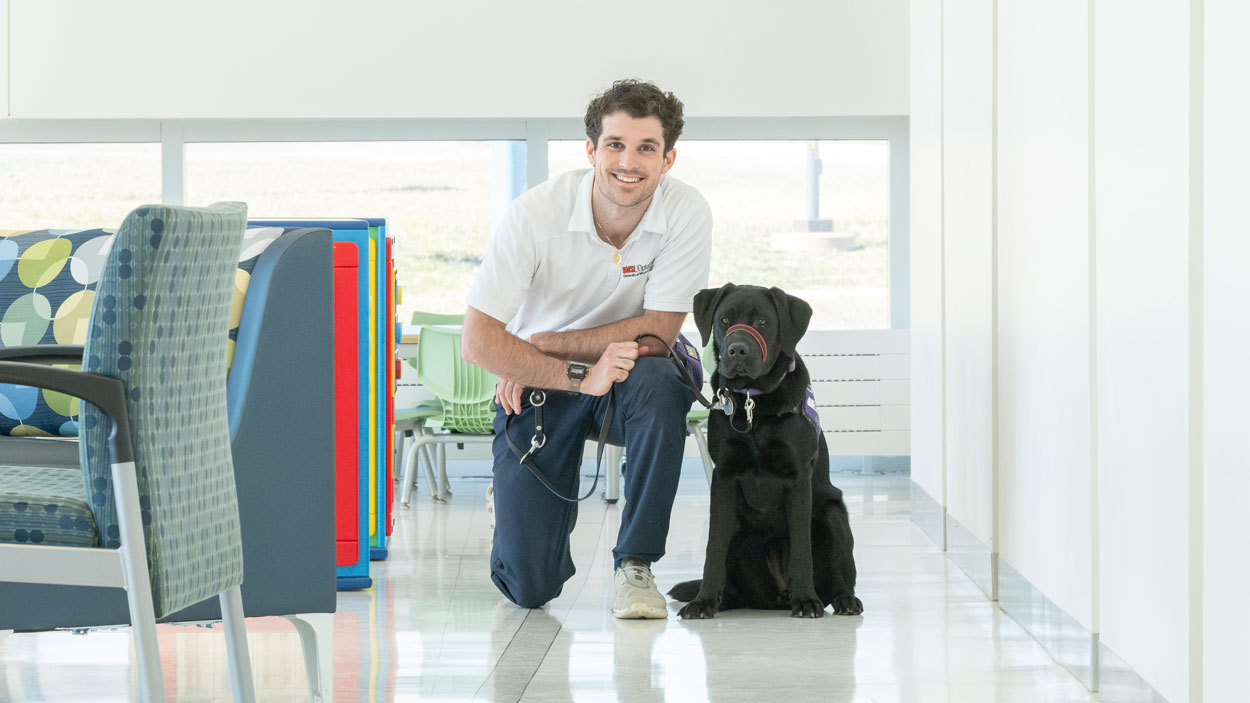
Luke Pellegrino is training Electra, a black lab, as a puppy raiser for the nonprofit Dogs Inc. (Photo by Derik Holtmann)
Luke Pellegrino has spent the past year learning much more than just the fundamentals of optometry at the University of Missouri–St. Louis. As a puppy raiser for the nonprofit Dogs Inc, he’s been working with a black lab puppy named Electra to master cues such as switching sides when doors open, ignoring distractions and settling close in crowded classrooms or train cars. Pellegrino, who will be stationed on a naval base for three years practicing optometry after he graduates through the U.S. Navy and Air Force Health Professions Scholarship Program, hopes to one day open his own low-vision practice and help connect patients with guide dogs like Electra.
Why did you want to train a guide dog?
During my sophomore year of undergrad, I worked at a medical fragile camp, Dream Oaks Camp, in southwest Florida. I saw a bunch of different campers over the nine weeks I was there, including kids with muscular dystrophy, Down syndrome and low vision. When the low-vision campers were telling me about their eye issues, I realized how much we take eyesight for granted until we don’t have it. They’d sit on the edge of the bed waiting for me in the morning so I could guide them to their destination. One of the camper’s mothers mentioned how much she wanted to get her son a guide dog, but there are not that many out there and they’re extremely expensive.
What skills have you been working on with Electra?
We’re at the point where we know all of our big skills – sit, heel, down, go. We have the cue “close,” where she comes in between my legs, sits and tucks her tail. We’re working on opening up doors. Mainly, my job is exposure. She comes with me on the Metro, and this summer I took her to the beach, and we went to New York City and did Times Square and a Broadway show.
How has training Electra impacted you as a future optometrist?
The more places I take her, the more I realize how influential she’s going to be in someone’s life. I take her to the barber shop or baseball games because someone’s bound to want to go to the baseball game. Visually impaired people should be able to go anywhere, and that’s why these guide dogs are so important. While shadowing at Lighthouse for the Blind this summer, I met a small patient with a cane who was so excited to see Electra, and she’s the perfect candidate to have a guide dog one day. That put it all in perspective for me. I’m only a small part of Electra’s life, but the reason I’m doing this is so that she becomes successful and eventually changes someone’s life.
This story was originally published in the fall 2025 issue of UMSL Magazine. If you have a story idea for UMSL Magazine, email magazine@umsl.edu.














